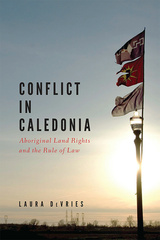
Inalienable Properties
The Political Economy of Indigenous Land Reform
As many Indigenous communities return to self-governance and self-determination, they are taking their own approaches to property rights and community development. Why did the Nisga’a Nation introduce property rights that can be traded in the market? And how have communities such as the Membertou First Nation sustained control over their lands in the face of economic pressures for saleable rights? This book explores the contrasting approaches to land rights illustrated by four Indigenous communities in Canada – the Westbank, Membertou, Nisga’a, and James Bay Cree nations.
Jamie Baxter traces how local leaders set the course for land rights and development in their communities during formative periods of legal and economic upheaval. Drawing on new research about institutional change in organizational settings such as business firms and labour unions, Baxter uses game theory to explore how community leaders have sustained inalienable land rights without turning to either persuasion or coercive force – the two levers of power normally associated with political leadership.
Inalienable Properties challenges the view liberalized land markets are the inevitable result of legal and economic change. It shows how inalienability can result from intentional choices and is linked to structures of decision-making that have long-lasting consequences for communities.
This book will appeal to a range of scholars and students in law, economics, political science, development studies, and Indigenous studies.
Baxter provides a useful summary of this history and the current state of these regimes - not an easy feat given such a complex history and diverse political geography.
Inalienable Properties pushes the field of Indigenous studies in a new direction. It applies the innovative lens of game theory to explore critical issues such as Indigenous membership and citizenship reforms, business development and investment decisions, and the adoption of political term limits and checks on power. The rest of the field will need to catch up.
Jamie Baxter is an associate professor at the Schulich School of Law, Dalhousie University, where he writes and teaches about land, food and agriculture, local government, and political economy.
1 Keeping the Land, Making the Market
2 Property Stories
3 Leaders and Land Reform
4 Save or Sell?
5 Ideas and Interests in Uncertain Times
6 The Future of Inalienable Properties
Notes; Bibliography; Index









